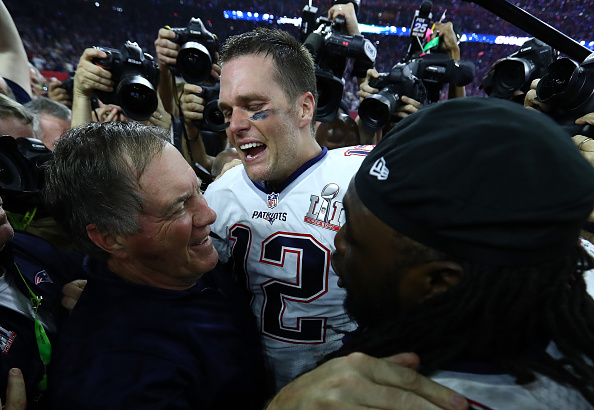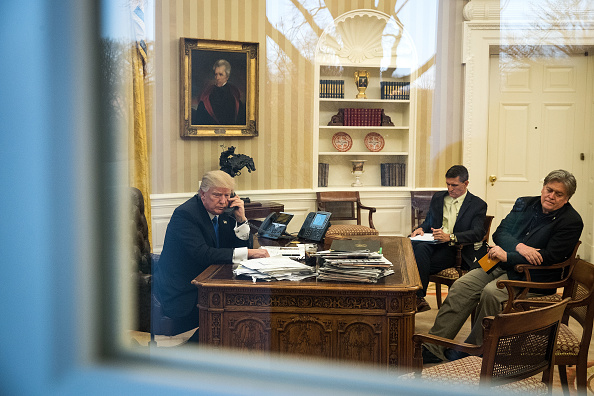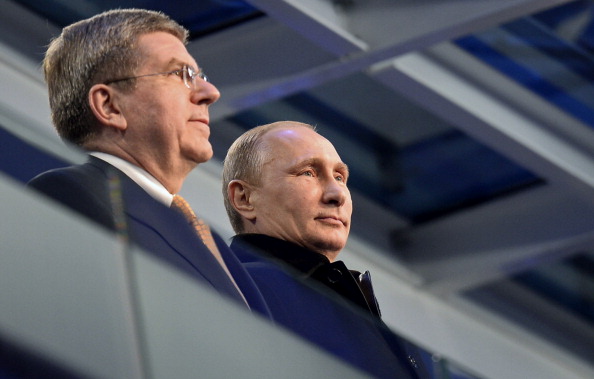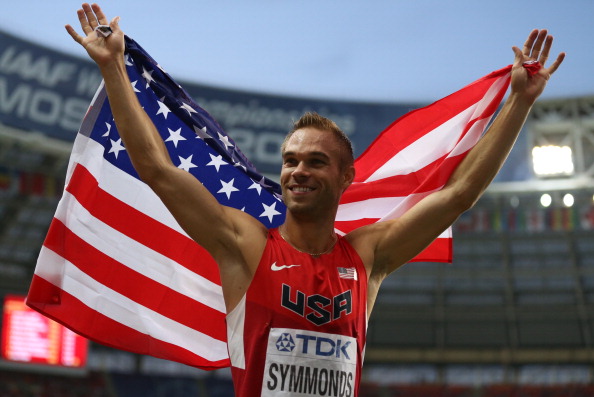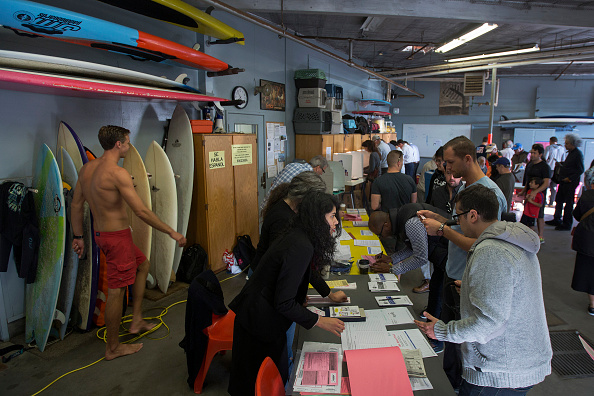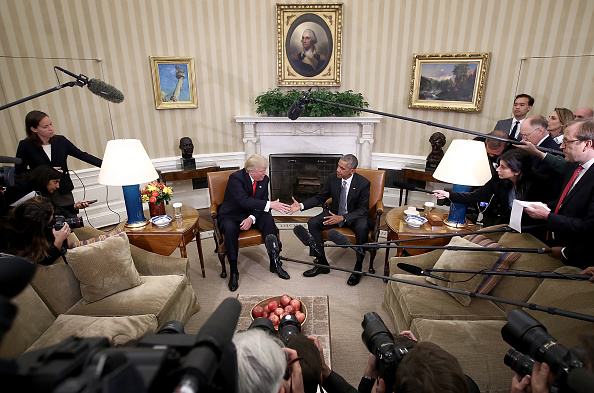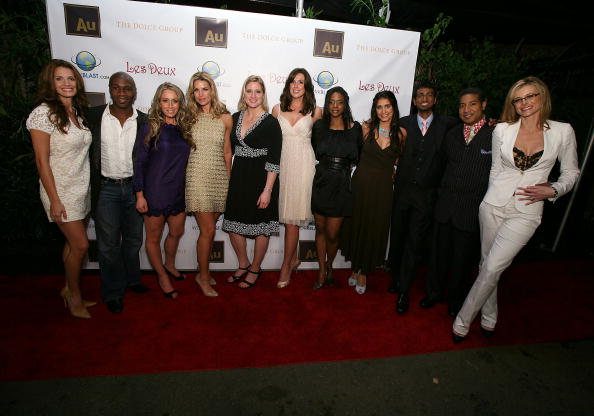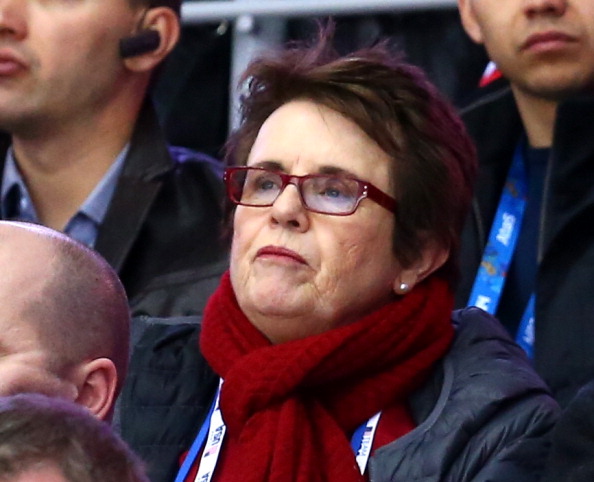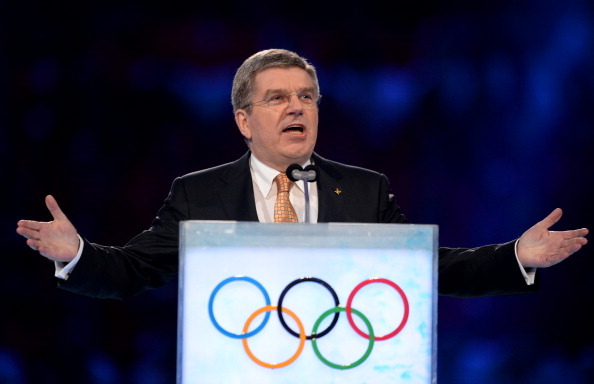The universe, if you are listening, speaks in whispers. There is karma, and it is real.
For the doubters, the universe offered a jolt of lightning proof Sunday that we are, indisputably, living in Donald Trump’s United States of America. The New England Patriots defeated the Atlanta Falcons, 34-28, in the NFL’s first overtime Super Bowl.

For those who are not within the being-vetted borders of the American enterprise and neither understand the pageantry nor the crash-and-boom of American football: not to worry.
Here’s a primer:
The Patriots play in a stadium outside Boston. Boston and New York, as metropolitan areas, have a longstanding provincial rivalry that the rest of us in the United States could care less about but gets shoved down our throats, anyway. Trump, obviously, is a New York guy.
Even so, he somehow has a very friendly relationship with the Patriots’ quarterback, Tom Brady, who in winning cemented his legacy as the greatest NFL quarterback of all time; with the Patriots’ coach, Bill Belichick, who seemingly smiles about as often as a Democratic presidential candidate wins in Alabama; and with the Patriots’ owner, Robert Kraft, who has long been one of the key behind-the-scene players in the league, which has but 32 owners and is thus a more exclusive club than even the U.S. Senate.
https://twitter.com/realDonaldTrump/status/828447350200926212
Across the 50 states, we have to wait until late August for our next football fix. If you don’t feel our pain, it’s quite OK. We get it.
But you had best take notice that within an hour of the game, Mr. Trump had tweeted out his appreciation for the winners.
The White House press secretary, using Boston slang to describe himself on Twitter as a "wicked" fan of both the Patriots and the baseball Red Sox, had been hilariously and mercilessly parodied over the weekend by NBC's Saturday Night Live.
https://youtu.be/UWuc18xISwI
Note: after the Patriot victory, Spicer took to Twitter to mix politics and sports.
https://twitter.com/seanspicer/status/828445799981912066
Before the game, to be clear, this is what Mr. Trump had posted to Twitter:
https://twitter.com/realDonaldTrump/status/828375073006444544
Ladies and gentlemen, particularly friends who are members of the International Olympic Committee:
On September 13, at an assembly in Lima, Peru, you are going to be weighing who to vote for in the campaign for the 2024 Summer Olympics. The time is now to start paying careful consideration, indeed the most careful consideration, to the change that has shaken up Washington, our world and, as events proved Sunday, our universe.
There are three candidates in that 2024 race: Los Angeles, Paris and Budapest.
This is not an ordinary race.
It is not going to go down like any of the races of the past 20 years, in particular the campaign in 2005 when New York — after Mr. Trump ran a leg of the Olympic flame relay in Manhattan — got dumped for 2012, London winning, and in 2009 when Chicago crashed and burned for 2016, Rio de Janeiro winning.
This is not to say that Mr. Trump is, or isn’t, or ought to, or not ought not, appear in person in Lima for the IOC session itself.
Not the point.
The point is that there is a new sheriff in town.
If you don’t like it, OK, roger that. I did not vote for Mr. Trump. But he is now my president. That’s the way this works.
So let’s all lose the double standard and the screaming hypocrisy. Like, immediately if not sooner, please.
We over here in the States are super-tired of it, to be honest, and unless we start having an honest conversation about it, it’s not going to go well for anybody. Not for us. Not for you, IOC friends, the majority of you over there in Europe. Not for anyone.
You don’t like it if the conversation turns toward money. You tend to believe that all we think about in the United States when it comes to the Olympics is money. That is a load of crap. We love the Olympic ideals and the Games themselves. Beyond which, American money is what makes the Olympic engine go. Yet when we actually mention that elemental truth, it’s like we passed gas in church.
This has got to stop.
In awarding editions of the Olympic Games, it would be totally and thoroughly hypocritical, sanctimonious and unfair to judge the United States by different standards than others, and in particular Russia and China. These bid campaigns are not designed to be morality plays. They, purportedly, are about what is best for the Olympic movement.
IOC friends, from 2008 through 2022 there are eight editions of the Games. In your wisdom, you awarded three of those eight to Russia and China. Yet the conversation would be about Mr. Trump? Because, exactly, why?
Because he's different? For sure he's different from Mr. Obama, his predecessor. But you made it plain in 2009 that you strongly disliked Mr. Obama, and vice-versa. So, where are we here? You want, or you somehow believe you have the right, to substitute your values and your judgments for those of the American people and our electoral college when it comes our domestic politics? On what grounds? That would be appropriate because -- sorry, same question, exactly why?
Let's try this: you don't like change and Mr. Trump for sure represents change? But you're the group that in recent years took the Summer Olympics to "new horizons" such as China and Brazil and, moreover, the Winter Games to Russia and South Korea.
The disconnect and double standards abound, and they really have to stop.
This is not a high school-style drama about whether you like so-and-so. To reiterate: this is about what is best for the Olympic movement right now. And what is best is Los Angeles.
Sochi 2014: $51 billion. Let's just leave that out there. You were super-cool with Mr. Putin. So if the argument is you plain and simple just don't like Mr. Trump -- let's just leave that out there, and note Mr. Putin.
Those 2008 Beijing Games: $40 billion.
Beijing, for goodness' sake, is now going to stage the Summer (2008) and Winter (2022) Games.
Beijing! Air pollution! Human rights! Literally like no snow in the mountains almost two hours away from the capital!
Two editions of the Games in 14 years!
And — Beijing will be the first city — ever — in Olympic history to stage both the Summer and Winter Games!
Really?
In May 2014, NBC — I am not at this space connected in any way with the network — agreed to pay $7.65 billion for the rights to televise six editions of the Games in the United States, 2022 to 2032.
The deal marked one of Thomas Bach’s first signature achievements as IOC president (he had been elected in September 2013), and the IOC release pointedly noted that it signaled a “major contribution to the long-term financial stability of the Olympic movement.”
Before that, in 2011, NBC had agreed to pay $4.38 billion for four Olympics, 2014 through 2020.
Just a little breakdown of that: $775 million for Sochi 2014; $1.22 billion for Rio 2016; $963 million for Pyeongchang 2018; and $1.41 billion for Tokyo 2020.
For all those billions, NBC — obviously — had to bid blind for many editions of the Games. Its money bought it a ratings-questionable Asian triple in 2018, 2020 and 2022. That is, South Korea, Japan and China.
To be clear, nobody “owes” NBC anything.
At the same time, a little logic, please.
It’s American money that kickstarts — or more — all the things the IOC does, including but not limited to the ability to reach out to other parts of the world, as it has done in moving the Summer Games around in every edition since 1996 in Atlanta.
Truly, the Olympic movement does good work each and every day around the world. But aspirational idealism doesn’t turn into reality because of candy canes, rainbows and unicorns. It takes plans and people and it takes cash.
It’s not dirty to talk about this kind of thing. It’s real. We all should have had this conversation a long time ago, and we should keep having it with each other to and through September 13 in Lima.
Let’s switch over to the IOC’s top-level corporate sponsors.
There are, with last month’s addition of the Chinese e-commerce giant Alibaba, 13.
Six are headquartered in the United States: Coca-Cola, Dow, GE, McDonald’s, Procter & Gamble and Visa.
Of the others, just to pick two:
Do you think Alibaba got in for the Chinese market? It already dominates that. It wants the United States.
Or Samsung, which is based in South Korea. Maybe, just maybe, it has designs on selling flat-screen TVs in every household in the United States?
Here’s what we Americans find so confounding.
Like any for-profit concern, an American business is in business to make money. Part of that for these corporations is, absolutely, growing the brand in other markets. We get that. They indisputably are seeking a return from connecting with the five Olympic rings, or they wouldn’t do it. That’s business.
But when we Americans say, what would happen to the Olympic movement if the American money dried up or the terms under which those American companies were allowed to seek their Olympic return on investment were subject to change — it’s like we are somehow considered impolite?
That’s what we just don’t get, to be honest.
You want, indeed the IOC needs, our money.
Beyond which, you send your children — and your national Olympic committees typically send their very best athletes — to our universities. Moreover, you make use of our world-class hospitals. And on and on. We generously extend, in almost every case, a gracious American welcome — the kind that makes for lifetime memories, sometimes even the sort that get passed down from generation to generation.
In a spirit of good faith and goodwill, the U.S. Olympic Committee leads spirited campaigns for the Games. We get humiliated. Then we get told that what we need to do is keep that cash from those American companies coming, and thanks for that, you know, but please work on being nicer, building better relationships, maybe being more, you know, European.
Something in all of that doesn’t seem quite right, you know?
Just a small point but maybe not, something telling:
The LA bid file turned in a couple of days ago runs to 110 pages. Paris: 148. Was there an IOC-imposed page limit? If so, did Paris exceed it? Is this evidence of yet another double standard?
Here, in quite another context, is what for sure does not seem right.
New York spent roughly $100 million bidding for 2012. Chicago, $80 million for 2016. Los Angeles will put out in the neighborhood of $60 million for 2024.
All in, that’s $240 million in roughly 14 years, from 2003-ish through 2017.
If LA gets kicked to the curb, too, the USOC ought to preempt any presidential or congressional action and declare, that’s it — we are out. Out for 2026. Out for 2028. Out for a very long time. Like, a very, very long time. Let’s concentrate just on the American mission and re-direct that kind of corporate American money toward the USOC instead of the IOC. Let’s see how the IOC gets along without an American bid for, oh, say, 40 years.
Seriously. Forty years.
Let’s take a poll: how many American athletes would prefer that the likes of $240 million in potential corporate funding be re-directed entirely toward, you know, American athletes?
The cozy secret the IOC has held close for a very long time is that it can keep taking American corporate money but rejecting American bid overtures, secure that the Americans will keep coming back with yet another bid.
That, too, has to stop.
The Olympic movement is genuinely at a tipping point.
It needs the United States after recent editions of the Games that cost $51 billion, $40 billion, $20 billion (2016, Brazil), $15 billion (2012, Britain) and may in Japan soar over $20 billion again.
A Los Angeles 2024 Games is budgeted at $5.3 billion, all in. It would be privately funded. It will be $5.3 billion because, unlike governmentally funded bids, which are the norm virtually everywhere else, including the Paris 2024 bid, it is what it is.
The very thing that has been a purported downfall of prior American bids — that the government is not responsible — is, now, the key to what the IOC needs.
Government-financed Games have, over the past 20 years, proven financially irresponsible. It’s almost certain that another government-financed games in 2024 would be the same, no matter any disputations because that is what happens. Here’s a bet right now that the $3.2 billion Paris says represent its infrastructure costs would balloon to two or three times that much if it wins for 2024.
The IOC cannot afford that, literally and figuratively.
IOC member friends, you can not afford, literally and figuratively, to say no to Los Angeles. We all need to have this direct sort of conversation.
Here's why: we don't know what we don't know. That is, we don't know what would happen afterward in Washington if LA loses.
But even after just a couple of weeks with Mr. Trump in office an informed observation is all too obvious: it very likely would not be positive or constructive.
For context:
IOC friends, you will recall how some if not many of you grumbled when in 2009 Mr. Obama’s security detail kept you waiting in Copenhagen, and the murmurs afterward were that the wait played into Chicago’s first-round exit?
This though Mr. Obama had recently won the Nobel Peace Prize? And became the first sitting U.S. president to pitch for an American bid, on behalf of his hometown? And — again, let’s be honest here — you embarrassed and humiliated him?
It’s not much of a logical leap to see the connection between Copenhagen 2009 and, in sequence, the FIFA indictments and the investigation by the U.S. Justice Department out of Brooklyn into allegations of Russian doping.
Mr. Trump wants Los Angeles to win. Take that to the bank, everyone.
Hypothetical here:
Let’s say the members go for Paris, even though it’s bedeviled by immigration-related security issues — Mr. Trump’s No. 1 priority — instead of Los Angeles.
Do you think Mr. Trump would be inclined to let that sort of slight slide?
Do you think, reminder we’re speaking hypothetically, that he would engage the Justice Department — soon to be led, probably, by Senator Jeff Sessions, the Republican from Alabama — anew?
This space has long maintained that it’s an overreach of American prosecutorial and judicial authority to go after international soccer authorities on a connection, in some cases tangential, to U.S. banking laws. But precedent being what it is — IOC friends, do you really want the FBI looking at you and your dealings?
Moreover:
Mr. Trump is, at least according to (his own) legend, something of a deal-maker.
Mr. Trump’s key advisor is Steve Bannon, who used to be a banker.
There are, as noted above, a lot of deals involving American money that drive the Olympic movement.
Who knows what interesting conversations might or might not be had involving whether those deals ought or ought not to be reviewed?
Maybe, as noted, in concert with the Justice Department. Or maybe a special project just run out of the White House itself. Is this what the Olympic movement wants?
To wrap up, friends, here is another bit of American slang for your careful consideration: karma can sometimes be such a bitch.


